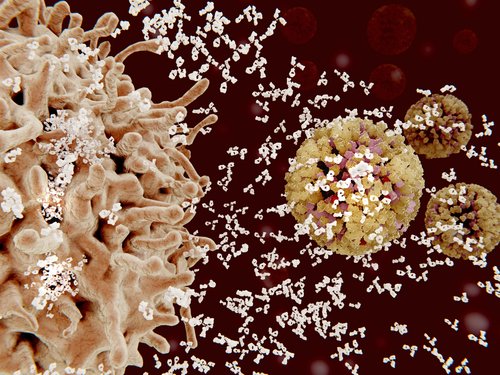SLE Self-Reactive Antibodies May Neutralize HIV Virus, Study Suggests

Some of the self-reactive antibodies produced in patients with systemic lupus erythematosus (SLE) were found to neutralize HIV, the virus responsible for causing AIDS, thus protecting patients from the disease.
The findings help explain why SLE patients show lower levels of HIV-1 infection and shed light on ways to promote the production of these antibodies in healthy patients.
A research team in Colorado reported the findings in a study titled, “Breaching peripheral tolerance promotes the production of HIV-1–neutralizing antibodies,” in The Journal of Experimental Medicine.
Some patients infected with HIV-1 make specific antibodies that recognize conserved regions of the HIV-1 virus. These “broadly neutralizing antibodies,” or bnAbs, bind to the surface of the virus — the envelope protein — and protect people from HIV infection.
But because bnAbs often develop many years after HIV infection and in a minority of patients, researchers are working to accelerate their production during HIV vaccination.
The body has a way of preventing the formation of antibodies that attack its own structures. This mechanism, called immunological tolerance, eliminates B-cells producing these antibodies before they have the chance to be harmful. But in patients with autoimmune diseases like SLE, this process is faulty.
Researchers knew that some bnAbs were also self-reactive, which suggested that the production of these antibodies could be halted by the same mechanism that was faulty in SLE. This gave researchers an idea of how to boost the production of bnAbs.
The team wondered if breaching the immunological tolerance would increase antibodies capable of neutralizing HIV-1.
They started testing mice with genetic defects that cause loss of immune tolerance. These mice show lupus-like symptoms because their immune B-cells produce self-reactive antibodies.
The team injected the mice with alum, a chemical that promotes antibody secretion and is often used as an adjuvant in vaccinations. As a result, they found higher levels of antibodies that could neutralize HIV-1.
After treating normal, healthy mice with a drug that breaks immunological tolerance, the team also found that mice started to produce antibodies capable of neutralizing HIV-1. If the mice were also vaccinated with an HIV-1 envelope protein, they were able to produce potent neutralizing antibodies against a range of HIV-1 strains.
In both cases, the levels of HIV-1 neutralizing antibodies correlated with the levels of a self-reactive antibody that recognizes a chromosomal protein called Histone H2A.
To confirm that these particular antibodies were protecting against HIV-1, the team isolated anti-Histone H2A bnAbs and placed them on cultured HIV-1 virus. They found that, indeed, these bnAbs were able to effectively neutralize HIV-1.
“As this study was performed in an animal model, it will of course be important to determine its relevance for HIV immunity in humans. Here, primary consideration will be determining whether immunological tolerance can be transiently relaxed without leading to detrimental autoimmune manifestations and as a means to possibly elicit HIV-1 bnAbs with vaccination,” Raul M. Torres, professor of immunology and microbiology at the University of Colorado School of Medicine, said in a press release.






